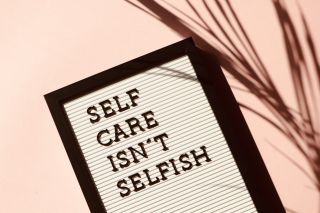Career
The Most Overlooked Type of Self-Care
A Personal Perspective: Why you should be focusing more on financial self-care.
Updated July 31, 2023 Reviewed by Devon Frye
Key points
- Financial self-care is often left off the menu of self-care options.
- Research shows that money troubles can prey on the mind, sapping a person of willpower and cognitive function.
- A secure financial foundation reduces stress, increases happiness, and enables more lifestyle choices.

What is the best self-care advice I can possibly give any adult?
Is it to exercise regularly? To meditate? To make sure you have plenty of “me time”? To follow your passions wherever they may lead you? To find your true love? To practice self-love? To find your purpose? To express your creativity? To get frequent mani-pedis and massages? To practice gratitude?
All these things are either essential, fun, or both. But my self-care advice takes a completely different path. I argue that the best self-care is financial self-care, including the ability to earn your own living and develop good money habits.
Unless you have a trust fund or another reliable source of income, learning the necessary attitudes and skills to support yourself, pay your bills, save your money, and build a secure financial foundation has got to be priority #1. Your mental health, your physical health, quality of life, and even your self-esteem and emotional health all are linked to it, at least in part, as I’ll explain below.
What Is Self-Care?
Financial self-care is often overlooked in conversations about self-care. For example, in this article, “The Seven Pillars of Self-Care,” types of self-care described are: mental; emotional; physical; environmental; recreational; social; and spiritual. Financial self-care is not mentioned.
The Harvard Medical School’s newsletter (4.29.23) offers a useful definition of self-care: “Far from just pampering yourself, self-care is a holistic approach to better health based on adopting healthy lifestyle habits.” However, their recommendations for “healthy lifestyle habits” focus solely on physical health. I would add “healthy money habits” to the list.
It’s not that pampering yourself is not important. Who doesn’t need a break from work and family duties now and then? Likewise, massages, “me-time,” and mani-pedis have a rightful place on the delicious menu of self-care options. And exercise and good relationships are magical elixirs that promote brain health, longevity, mental health, and physical health, among many other benefits.
But a massage or even a relaxing walk is self-care for the moment; the ability to support yourself is self-care for a lifetime.
The Disadvantages of Not Earning Money
Maybe it’s too obvious to mention, but without earning enough money to support yourself (and your family, if you have one), life is a never-ending struggle for survival. Making ends meet requires a constant juggling act—deciding which bill to pay first, weighing each purchase, and staggering under every unexpected or emergency expense.
But there are some disadvantages to money scarcity that are not so obvious, including these:
- Your mental health may be shakier because you are constantly under stress. Poverty imposes a mental strain on anyone having to cope with it, as economist Sendhil Mullainathan writes in this article.
- Money troubles can reduce your willpower, judgment, and even IQ, as I explain in my blog, "This is Your Brain on Financial Troubles."
- Money troubles may lead to poorer brain health, not just poorer mental health. In a 2019 study entitled, "Drops in income may not only hurt the wallet, they may harm the brain," financial stress among people 23-35 was correlated with poorer thinking skills, smaller brain volume, and reduced connectivity within the brain in middle age.
- One potential result of financial insecurity is poor decision-making. Poor decision-making can then lead to more financial insecurity, perpetuating a vicious cycle.
No wonder Mark Twain famously said, “The lack of money is the root of all evil.”
The Varied Joys of Earning and Having Money
Yes, it would be nice to be rich, but having a decent amount of money in the bank offers a wealth of benefits, too, including a more comfortable lifestyle. The following advantages to earning money go beyond the obvious:
- When you don’t have to think about money all the time, your mental health is better. Your mind is free for work, play, creativity, family time, or whatever is closest to your heart.
- You can use your money to buy some types of self-care—massages, exercise gear, healthy food, recreation, education, medical care, and therapy, to name a few.
- If you make a bad decision about what you buy, it won't hurt your bank balance as much.
- As you acquire work skills, you also accumulate more self-confidence. You may even discover your sense of purpose in this world—something that matters to you or a contribution you can make.
- Some of your colleagues at work will become mentors, allies, and even close friends.
- If your relationship with your significant other goes south, you’ll know you can survive on your own. (If you are in an abusive relationship, call 800-799-7233 or 988 for help.)
- If a problem can be solved with money, you can solve it with money.
- A retirement savings cushion will give you more choices in your retirement years. The older years turn out to be the best years of your life for many; money enables you to make the most of them.
- Finally, recent research has revealed that more money does indeed correlate with more happiness, even above and beyond the level at which basic needs are satisfied.
In a Nutshell
Of course, you can help yourself attain financial stability, or even financial independence, by saving and investing more, spending wisely, and avoiding debt. You can educate yourself about money choices. You can also use self-care techniques such as exercise and meditation to counter the stress caused by the ups and downs of working life. However, given the unpredictable and often harsh nature of the working world, it's important to note that individuals can only do so much. Social supports and a strong safety net are also needed.
To be clear, I am not arguing that you need to give up your artistic or entrepreneurial aspirations to support yourself and your family. Even if you have a full-time job, find a way to express your creativity or advocate for social justice in your spare time, while keeping your eyes open for ways to segue into employment situations that better suit your personality, values, and interests.
Further, I am not arguing that all you need is money. For a balanced and meaningful life, relationships, health, purpose, and pleasure are all aspects of self-care that contribute to happiness and health. Money is necessary but not sufficient.
Even if you never find the perfect career niche or earn piles of money, you’ll have the satisfaction of knowing you are a skillful, competent person, who can depend on yourself—for income, purpose in life, and basic needs.
(c) Meg Selig, 2023. All rights reserved. For permissions, contact me here.




